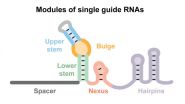Flexibility in disease outbreak management could save lives and money
2014-10-21
(Press-News.org) Research by a team of epidemiologists from the UK and the USA has proposed a new approach for responding to and managing disease outbreaks. They say lives and money could be saved if decisions are adapted to relevant information about the dynamics of the current crisis and not based on retrospective analyses of prior crises, trials and interventions.
Dr Michael Tildesley, a lecturer in infectious disease modelling in the School of Veterinary Medicine and Science at The University of Nottingham and co-author of the paper, said: "Organisations involved in the outbreak of disease should be able to change approaches as new information becomes available. In the early stages of a new disease outbreak there is often insufficient information to make a decision regarding the best control policy. At the same time policy makers cannot afford to delay until that uncertainty is resolved before introducing interventions. Adaptive management provides a mechanism for introducing control at the onset and then using information gained during the outbreak to determine the most effective long term management action."
The research, carried out by experts at The University of Nottingham and Pennsylvania State University, is published on Tuesday 21 October 2014, in the academic journal PLOS Biology.
The study suggests current efforts to prevent or stem the spread of disease fall short because of confusion and limited information about disease dynamics. It shows adaptive management would allow researchers to use the knowledge gained during an outbreak to update ongoing interventions with the goal of containing outbreaks more quickly and efficiently.
The Benefits of Adaptive Management
The research was carried out in collaboration with Dr Katriona Shea, Professor of Biology and Matthew Ferrari, Assistant Professor of Biology and Statistics at Pennsylvania State University; Michael C Runge, from the United States Geological Survey at Patuxent Wildlife Research Center and Christopher J Fonnesbeck, from the Department of Biostatistics at Vanderbilt University School of Medicine. It presents two scenarios in which adaptive management would be likely to improve outcomes.
The team explored the implications of adaptive management on the 2001 foot and mouth outbreak in the UK and measles vaccinations strategies in the USA as examples of how a more flexible approach would be less draconian, could save lives and money.
Dr Tildesley said: "We demonstrate expected savings of up to £20 million in terms of lower livestock losses to culling in a foot-and-mouth outbreak. Similarly, up to 10,000 cases could have been averted in a measles outbreak like the one observed in Malawi in 2010. Adaptive management allows real-time improvement of our understanding, and hence of management efforts, with potentially significant positive financial and health benefits."
Professor Shea said: "Culling decisions during the outbreak of foot and mouth were contentious as there was so much uncertainty about the spatial scale of transmission. Many farmers felt that they were being penalised for being in the vicinity of infected farms when they believed that they were not at risk. Adaptive management in the case of foot and mouth disease would initially employ a less severe approach. This would reduce the number of cattle culled and rely on real-time updates to modify responses — more severe culling would only be recommended if justified by the spread of the outbreak."
Dr Ferrari, who consults with organisations such as the Centres for Disease Control and Prevention, the World Health Organisation and Doctors Without Borders on disease outbreak prevention and response, said: "In measles outbreaks responders need to make decisions and act quickly based on the information available. An outbreak contained to young children would call for a fast and nimble response, moving from town to town very quickly and vaccinating only young children. Conversely, an outbreak affecting a broader age range requires a slower, broader, more methodical response.
There are trade-offs to taking the wrong approach. If you did the fast, nimble child vaccination but the outbreak had a broader risk, you would miss a lot of people. If you did the slower, broader, more methodical response, you'd protect lots of people but the response may not be fast enough."
A More Nuanced, Context-Specific Approach
Dr Ferrari said: "The new approach would mean that when you find yourself on the ground, responding to an outbreak, and you have evidence that a change will result in improvement, you can make that change without having to provide post-hoc justification because you have incorporated that potential into the plan.
"Historically the argument has been for a very static policy to manage infectious disease outbreaks because it's clean and easy to understand. We recognise that a more nuanced, context-specific approach could be better. We need to put the possibility of changing midstream into our toolbox, integrating scientific discovery with policy making to improve intervention efforts."
INFORMATION:
The research was funded by the Biotechnology and Biological Sciences Research Council and the National Institutes of Health EEID (award 1 R01 GM105247-01), the RAPIDD Program of the Science and Technology Directorate of the Department of Homeland Security and the Bill and Melinda Gates Foundation.
Once published a link to the article can be found here: http://www.plosbiology.org/article/info:doi/10.1371/journal.pbio.1001970
ELSE PRESS RELEASES FROM THIS DATE:
2014-10-21
What is the best way to handle a disease outbreak? Current efforts to prevent or stem such outbreaks may fall short because of uncertainty and limited information about the real-time dynamics of the specific disease outbreak. A team of epidemiologists, led by two Penn State University researchers, proposes a new approach for responding to and managing disease outbreaks -- a flexible approach that could save many lives and millions of dollars.
The approach, called "adaptive management," allows decision-makers to use knowledge they gain during an outbreak to update ongoing ...
2014-10-21
In 2005, in a landmark paper viewed well over a million times, John Ioannidis explained in PLOS Medicine why most published research findings are false. To coincide with PLOS Medicine's 10th anniversary he responds to the challenge of this situation by suggesting how the research enterprise could be improved.
Research, including medical research, is subject to a range of biases which mean that misleading or useless work is sometimes pursued and published while work of value is ignored. The risks and rewards of academic careers, the structures and habits of peer reviewed ...
2014-10-21
Cesarean delivery is the most common inpatient surgery in the United States. US cesarean rates increased from 20.7% in 1996 to 32.9% in 2009 but have since stabilized, with 1.3 million American women having had a cesarean delivery in 2011. Rates of cesarean delivery vary across hospitals, and understanding reasons for the variation could help shed light on practices related to cesarean delivery.
Katy Kozhimannil (University of Minnesota School of Public Health, Minneapolis, USA) and colleagues S.V. Subramanian and Mariana Arcaya (Harvard School of Public Health, Boston, ...
2014-10-21
personalised nutrition based on an individual's genotype - nutrigenomics - could have a major impact on reducing lifestyle-linked diseases such as obesity, heart disease and Type II diabetes
a study of more than 9,000 volunteers reveals strict regulations need to be put in place before nutrigenomics becomes publicly acceptable due to people's fears around personal data protection
led by Newcastle University, UK, and involving experts from the universities of Ulster, Bradford, Porto (Portugal) and Wageningen (Netherlands), the study is the first to assess consumer acceptance ...
2014-10-21
EUGENE, Ore. -- Oct. 21, 2014 -- University of Oregon chemists have devised a way to see the internal structures of electronic waves trapped in carbon nanotubes by external electrostatic charges.
Carbon nanotubes have been touted as exceptional materials with unique properties that allow for extremely efficient charge and energy transport, with the potential to open the way for new, more efficient types of electronic and photovoltaic devices. However, these traps, or defects, in ultra-thin nanotubes can compromise their effectiveness.
Using a specially built microscope ...
2014-10-21
MADISON, Wis. — As Dane County begins the long slide into winter and the days become frostier this fall, three spots stake their claim as the chilliest in the area.
One is a cornfield in a broad valley and two are wetlands. In contrast, the isthmus makes an island — an urban heat island.
In a new study published this month in the Journal of Applied Meteorology and Climatology, University of Wisconsin-Madison researchers highlight the urban heat island effect in Madison: The city's concentrated asphalt, brick and concrete lead to higher temperatures than ...
2014-10-21
BETHESDA, MD – Age-related loss of the Y chromosome (LOY) from blood cells, a frequent occurrence among elderly men, is associated with elevated risk of various cancers and earlier death, according to research presented at the American Society of Human Genetics (ASHG) 2014 Annual Meeting in San Diego.
This finding could help explain why men tend to have a shorter life span and higher rates of sex-unspecific cancers than women, who do not have a Y chromosome, said Lars Forsberg, PhD, lead author of the study and a geneticist at Uppsala University in Sweden.
LOY, ...
2014-10-21
(Philadelphia, PA) – Chest pain doesn't necessarily come from the heart. An estimated 200,000 Americans each year experience non-cardiac chest pain, which in addition to pain can involve painful swallowing, discomfort and anxiety. Non-cardiac chest pain can be frightening for patients and result in visits to the emergency room because the painful symptoms, while often originating in the esophagus, can mimic a heart attack. Current treatment — which includes pain modulators such as selective serotonin reuptake inhibitors (SSRI) — has a partial 40 to 50 ...
2014-10-21
Customized genome editing – the ability to edit desired DNA sequences to add, delete, activate or suppress specific genes – has major potential for application in medicine, biotechnology, food and agriculture.
Now, in a paper published in Molecular Cell, North Carolina State University researchers and colleagues examine six key molecular elements that help drive this genome editing system, which is known as CRISPR-Cas.
NC State's Dr. Rodolphe Barrangou, an associate professor of food, bioprocessing and nutrition sciences, and Dr. Chase Beisel, an assistant ...
2014-10-21
A longstanding question among scientists is whether evolution is predictable. A team of researchers from UC Santa Barbara may have found a preliminary answer. The genetic underpinnings of complex traits in cephalopods may in fact be predictable because they evolved in the same way in two distinct species of squid.
Last, year, UCSB professor Todd Oakley and then-Ph.D. student Sabrina Pankey profiled bioluminescent organs in two species of squid and found that while they evolved separately, they did so in a remarkably similar manner. Their findings are published today in ...
LAST 30 PRESS RELEASES:
[Press-News.org] Flexibility in disease outbreak management could save lives and money




